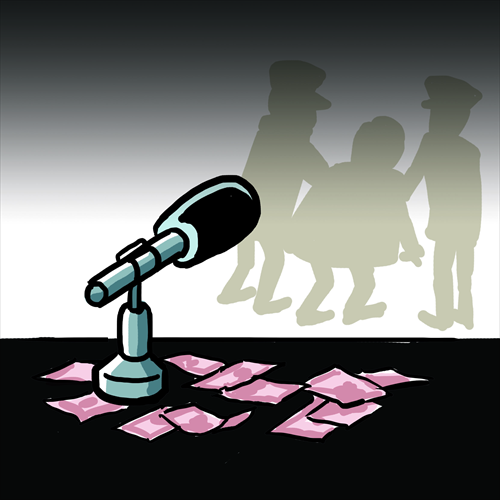HOME >> OP-ED
Integrity, not style, matters to journalists
By Rong Xiaoqing Source:Global Times Published: 2014-7-17 18:48:01

Illustration: Liu Rui/GT
Rui Chenggang, the famous host of CCTV's financial news channel, was taken away by police recently amid China's ongoing anti-corruption campaign. Critics have been piling on him since then, with a series of sometimes vicious attacks online. Curiously, most didn't focus on his possible corruption but on his journalistic style, as if that was what dragged him from the glamorous spotlight he used to enjoy.Rui did a lot of provocative stunts. He ranted against "Western cultural invasion" in his blog when Starbucks opened in the Forbidden City in 2007. That was a successful assault - the Starbucks cafe there closed soon after.
He desperately and successfully grabbed a last opportunity that was reserved for journalists from host country South Korea to ask a question of US President Barack Obama during the G20 summit in 2010, claiming he could speak for "all of Asia."
He also jabbed former US ambassador to China Gary Locke at the World Economic Forum in 2011 by asking: "I hear you flew here coach. Is that a reminder that the US owes China money?"
This cheek won him millions of fans online, but also got him many enemies, especially in the domestic media industry.
Chinese colleagues bashed him for his audacity, self-importance, and misinformed questions, blemishes in his wildly acclaimed English, and, more importantly, the zealous nationalism that was reflected in most of his interviews with foreign politicians and executives.
All of these were enumerated once again by critics after his detention.
I am not a fan of Rui. I don't like any of his annoying traits. And I think his critics are right in their diagnosis. But I don't think this should lead to a death sentence for his style of journalism. On the contrary, there should be more journalists adopting his style in China to make the profession more dynamic.
In a world of healthy, questioning reportage, the manners of journalists should be as diverse as their personalities. No matter if you are aggressive or gentle, rude or polite, provocative or soothing, in the end all you need is to find your own way to have the interviewees talk to you.
In the years I have worked as a journalist in New York, I've seen colleagues pushing unwilling sources hard, driving one another to get a better picture, or asking endless "follow-up questions" to get to the heart of an issue.
I myself, as a petite Asian woman covering politics, often have to thrust my hand in front of the faces of the mayors, governors, lawmakers and other officials to get an opportunity to ask my question among much taller and more aggressive colleagues.
Of course, unlike many reporters inside and outside of China who usually ask their questions in a neutral tone to be able to maintain at least an appearance of objectivity, Rui often made it clear what views he had through the questions he asked. But this is no different from US journalists from advocacy media such as Fox News on the right and MSNBC on the left.
If Rui thought he represents China or, in his own words "Asia," he had the right to conduct his work as an advocate journalist.
Nonetheless, Rui's journalistic style should not be the talking point at this moment at all. What should concern us more is why a journalist was targeted in the anti-corruption movement.
I worked as a reporter in China for three years before I came to the US in 2000, and I was familiar with the custom of the "red envelope." But in the new millennium, journalists in China clearly have gotten greater access to the kind of monetary inducements that a few red envelopes cannot contain.
It's not like there have never been no corrupt journalists in the US. Former Wall Street Journal columnist R. Foster Winans was convicted of insider trading for leaking the content of his influential "Heard on the Street" column to some stock traders and pocketing kickbacks as rewards. It was a famous case. But it happened in the 1980s. Any cases since then have been much lower profile.
In China, Rui and a few of his bosses at CCTV who were detained earlier are hardly alone.
These days most media outlets in the US have an in-house policy that bans financial journalists from owning stocks and reporters from taking gifts worth more than about $20 to $25 from sources.
When I was a student in journalism school in the US, a classmate was forced by professors to return the diamond a jeweler gave her as a "thank you" gift, after her profile of the jeweler was published by The New York Times. In China, professors would be unlikely to get involved.
But it doesn't matter that we are far from perfect. What's more important is every time when disgrace happens, we make a little progress toward perfection by laying down one more track for the machine of self-discipline.
If we cannot do this, neither lifting censorship, embracing new media, nor adopting elegant interview styles can rescue the media industry in China.
The author is a New York-based journalist. rong_xiaoqing@hotmail.com
Posted in: Columnists, Viewpoint, Rong Xiaoqing